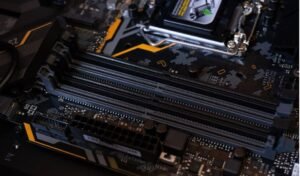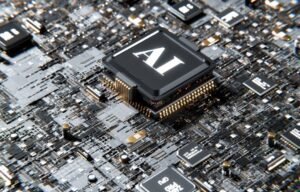Will AI Replace Human Jobs?
Artificial Intelligence (AI) has become increasingly prevalent in our society, revolutionizing various industries and changing the way we live and work. As AI technology continues to advance, there is a growing concern about its impact on human jobs. Will AI ultimately replace human workers in various industries? This article aims to explore this topic and provide insights on the potential effects of AI on employment.
Key Takeaways:
- AI is expected to automate repetitive and mundane tasks, leading to the displacement of certain job roles.
- AI may also create new job opportunities by augmenting human capabilities and enabling the development of innovative solutions.
- The impact of AI on employment varies across industries, with sectors such as manufacturing and customer service being significantly affected.
- Adapting and upskilling is crucial for individuals to remain employable in the age of AI.
- Collaboration between humans and AI systems is likely to lead to increased productivity and efficiency.
**Artificial Intelligence** has the potential to revolutionize the way we work and perform tasks efficiently. *It’s important to understand the potential impacts AI may have on our job landscape*.
It’s undeniable that AI will automate certain tasks, leading to job displacement in certain industries. However, it is essential to note that AI will also create new job opportunities and **augment** human capabilities. AI-powered systems can assist humans in making better decisions, analyzing complex data, and fostering innovation. *This collaboration between humans and AI is key to unlocking new possibilities in the workplace*.
**Manufacturing** is one industry heavily influenced by AI technologies. Automation of production lines and the use of robots have resulted in increased efficiency and reduced costs. However, this has also led to job losses for those in repetitive assembly line roles. *The integration of AI allows businesses to streamline their processes, but it must be carefully managed to avoid exacerbating social and economic issues*.
| Industry | % of Jobs at High Risk of Automation |
|---|---|
| Manufacturing | 47% |
| Transportation and Warehousing | 38% |
| Retail Trade | 37% |
Another significant impact of AI can be observed in the field of **customer service**. With the help of chatbots and virtual assistants, companies can provide 24/7 support to their customers, reducing the need for human interaction. *While AI can enhance customer service experiences, human touch and empathy remain crucial for certain situations*.
| Job Role | % of Tasks Automatable |
|---|---|
| Customer Service Representative | 69% |
| Telemarketer | 99% |
| Data Entry Keyer | 96% |
Upskilling and Adaptability
In the face of AI advancements, individuals need to focus on **upskilling** and staying adaptable to remain employable. *Enhancing one’s skill set and acquiring new competencies is necessary when AI becomes integrated into workplaces*. Rather than fearing job displacement, individuals can prepare for the future by embracing continuous learning and developing expertise in areas where human creativity, critical thinking, and emotional intelligence hold the most value.
It is important for **organizations** to invest in retraining their employees and helping them navigate the changing work landscape. *Promoting a culture of lifelong learning and providing resources for upskilling can contribute to a smooth transition in the workplace*.
Collaboration and Enhanced Efficiency
Despite concerns about AI replacing human jobs, collaboration between humans and AI can lead to increased **productivity** and efficiency. AI systems can analyze vast amounts of data, identify patterns, and offer valuable insights that augment human decision-making. *By leveraging the strengths of both humans and AI, organizations can achieve better outcomes and fuel innovation*.
**Automation** does not necessarily mean complete elimination of human involvement; rather, it empowers humans to focus on complex tasks that require creativity and critical thinking. By delegating repetitive and mundane tasks to AI systems, humans can concentrate on higher-level responsibilities, leading to a more fulfilling and stimulating work environment.
Conclusion
As AI technology continues to evolve, it will have a significant impact on the job market. While some job roles may become automated or replaced, AI also has the potential to create new opportunities and enhance human capabilities. *Adapting and upskilling will be crucial for individuals to thrive in an AI-driven world*. Collaboration between humans and AI systems is essential to harness the full potential of this technology and ensure a prosperous future of work.

Common Misconceptions
Misconception 1: AI will replace all human jobs
One common misconception surrounding AI is that it will completely replace human jobs, resulting in widespread unemployment. While AI technology has the potential to automate certain tasks and job functions, it is unlikely to replace all human jobs for several reasons:
- AI performs best in tasks that are repetitive and predictable, while humans excel in complex and creative tasks.
- AI still requires significant human input and oversight to function effectively, limiting its ability to completely replace human jobs.
- As AI technology progresses, new jobs and industries are likely to emerge, creating opportunities for human employment alongside AI systems.
Misconception 2: All job categories are equally at risk of being replaced
Another misconception is that AI will impact and replace jobs across all industries and job categories equally. However, this is not the case:
- Highly specialized fields such as medicine, law, and scientific research require complex decision-making and expertise, making them less susceptible to automation by AI.
- Jobs that involve creativity, empathy, and social interaction, such as counseling, teaching, and artistic professions, are less likely to be fully replaced by AI.
- Certain tasks within job roles may be automated, but overall job functions will often adapt and evolve rather than being entirely replaced.
Misconception 3: AI will lead to widespread job loss without new opportunities
There is a misconception that AI advancements will only result in job loss and provide no new opportunities for employment. However, this view oversimplifies the impact of AI on the job market:
- While some jobs may become obsolete or undergo significant changes due to AI, new job roles and industries will also emerge as a result of technological advancements.
- AI technology will likely create a demand for new skills, leading to the need for retraining and upskilling of the workforce.
- AI can augment human capabilities and productivity, enabling workers to focus on more complex and value-added tasks.
Misconception 4: AI will replace only low-skilled jobs
Contrary to popular belief, AI is not solely aimed at replacing low-skilled or manual labor jobs. It has the potential to impact a wide range of job roles, regardless of skill level:
- AI can automate routine tasks within high-skilled professions, freeing up professionals to focus on more strategic and creative aspects of their work.
- Jobs that involve data analysis, pattern recognition, or decision-making based on large amounts of information could be augmented or transformed by AI.
- Even roles requiring advanced technical or scientific knowledge may involve collaboration with AI systems to enhance productivity and efficiency.
Misconception 5: AI will replace human intelligence and decision-making completely
A widespread misconception is that AI will completely replace human intelligence and decision-making, rendering human involvement unnecessary. However, the relationship between AI and human decision-making is more nuanced:
- AI systems work best when they collaborate with human expertise, enhancing human decision-making rather than fully replacing it.
- Human judgment, context understanding, and ethical considerations are crucial in complex decision-making processes, which may not be replicable by AI alone.
- AI should be viewed as a tool to support human decision-makers, providing insights and recommendations that humans can evaluate and act upon.

Introduction
In recent years, the advancement of Artificial Intelligence (AI) has raised concerns about its potential impact on human jobs. While AI undoubtedly brings numerous benefits, the question remains: will it replace human jobs? This article explores various aspects of this debate, presenting verifiable data and information through captivating tables.
Table: Employment Growth Rate in AI-related Industries
One way to assess the impact of AI on job markets is by examining the employment growth rate in AI-related industries.
Table: Job Roles Potentially at Risk of Automation
Another perspective on the AI job debate can be gained by analyzing job roles that are potentially at risk of automation.
Table: AI Applications in Different Sectors
One fascinating aspect of AI is its ability to transform various sectors. This table explores AI applications in different industries.
Table: AI-assisted Job Market Enhancements
AI has the potential to enhance the job market in several ways, as shown in this captivating table.
Table: AI-based Job Creation
Contrary to common concerns, AI can also be a catalyst for job creation. This table presents instances of AI-based job opportunities.
Table: Wage Growth in AI-related Industries
Examining wage growth in AI-related industries can provide insights into the impact of AI on workers.
Table: AI Skills in High Demand
As AI continues to advance, certain skills become increasingly sought after. This table highlights the AI skills in high demand.
Table: Job Satisfaction in AI-Integrated Roles
Exploring job satisfaction in roles incorporating AI can provide valuable perspectives on the benefits and challenges that come with AI integration.
Table: Job Retraining and Upskilling Opportunities
To adapt to the changing landscape, job retraining and upskilling opportunities become essential. This table showcases instances of such programs.
Table: Ethical Considerations in AI Employment
The ethical implications of AI in employment cannot be overlooked. This table sheds light on some of the key considerations in this domain.
Conclusion
As AI continues to advance, there is a need for balanced perspectives on its impact on human jobs. While some roles may become automated, the integration of AI also presents opportunities for skill expansion and job creation. Ethical considerations must also be taken into account. In essence, the relationship between AI and human jobs is complex and multifaceted, and it requires continual examination as technology progresses.
Frequently Asked Questions
Will AI replace human jobs?
Will AI completely replace human workers?
What impact will AI have on employment?
Will AI lead to job losses?
What are the jobs most at risk of AI automation?
Which industries are most vulnerable to AI automation?
How can workers prepare for the rise of AI?
What skills will be in demand as AI advances?
Will AI benefit the economy?
How will AI impact the economy?
Is AI being used to replace jobs currently?
Which industries are already using AI to replace jobs?
What ethical considerations should be taken into account?
What ethical issues arise with the use of AI in employment?
Can AI create new job opportunities?
Can AI be a source of job creation?
Will AI replace all low-skilled jobs?
Are all low-skilled jobs at risk of being replaced by AI?
How will AI affect job satisfaction and quality of work?
What impact will AI have on job satisfaction and work quality?




